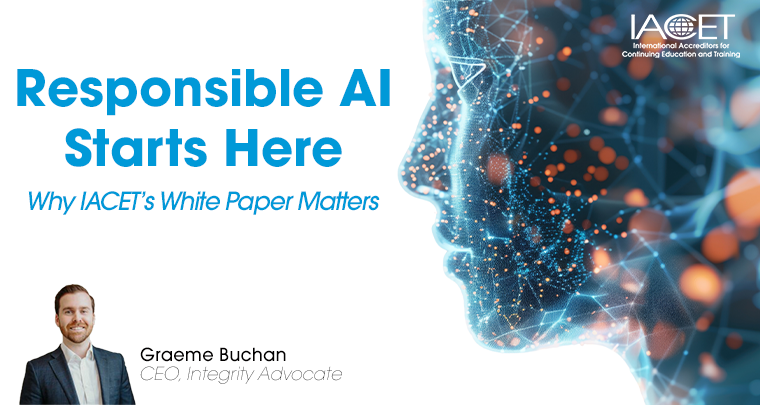Responsible AI Starts Here: Why IACET's AI White Paper Matters

As someone deeply invested in both innovation and integrity in digital learning, I found IACET’s white paper on AI adoption in continuing education to be exceptionally timely and well-structured.
The paper successfully maps out the complex terrain of artificial intelligence, providing a practical framework for organizations navigating this rapidly evolving space. Two points in particular stood out to me, both as validation of current conversations and as prompts for further progress.
1. Transparency Can’t Be Optional
As artificial intelligence becomes more embedded in our learning systems, transparency must be treated as a core requirement. Internally, organizations need to clearly communicate how AI is being used, how it supports their goals and where ethical guardrails are drawn. Transparency here is meant to empower staff and align practices with values.
Externally, learners have a right to understand when and how AI is influencing their educational experience. Are their decisions being guided by machine learning algorithms? Is their data being analyzed or stored? We strengthen trust when communication is proactive, plainspoken and rooted in consent. That trust is essential to scaling AI responsibly, especially in environments where stakes are high and outcomes matter.
2. We Can’t Assume Everyone’s at the Same Starting Line
The white paper makes a strong case for integrating AI into continuing education, but it's important to recognize that not all organizations are equally prepared. Readiness looks different depending on your size, sector and resources—assuming otherwise risks widening existing gaps. Successful adoption demands an honest assessment of current capabilities, cultures and constraints.
By building flexible pathways to implementation, we make it possible for every organization to move forward at the pace that fits them. Scalable rollouts, tailored training and options for gradual adoption can help ensure AI enhances rather than overwhelms. When we plan for different starting lines, we open up a more inclusive and sustainable path to innovation.
Building Trustworthy Systems Starts with Thoughtful Steps
The promise of AI in education is powerful, but realizing that promise requires more than tools and technology. It takes intention. It takes clarity. Above all, it takes a commitment to equity and transparency at every step.
IACET’s white paper lays the groundwork for getting there responsibly. By acknowledging the need for readiness, championing ethical practices and calling for open communication, this work pushes the conversation in the right direction. With shared standards and thoughtful guidance, we can ensure no one is left behind in the responsible adoption of AI.
About the Author

Graeme Buchan is the CEO of Integrity Advocate, a Vancouver-based technology company specializing in identity verification, participation monitoring, and exam proctoring. With a background in corporate finance and international banking from his time at HSBC, and an MBA from INSEAD, Graeme brings a strategic lens to the intersection of technology and integrity in education. His leadership is grounded in a commitment to learner privacy, ethical innovation, and scalable solutions that serve certification bodies and educational institutions alike.
